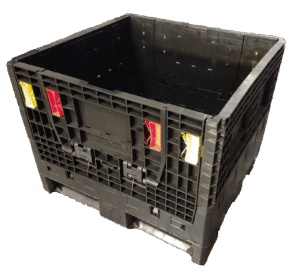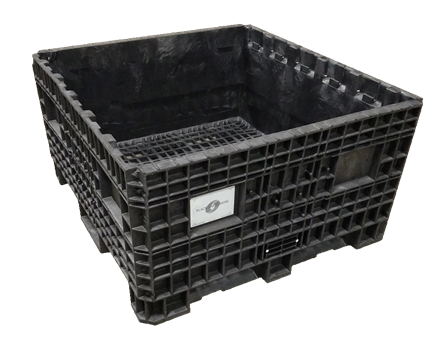Why Bulk Containers Are Essential for Cost-Effective and lasting Transport
Bulk containers play a vital function in contemporary logistics. They promote the efficient activity of huge amounts of products, thus optimizing transportation processes. This approach not just reduces costs but also lessens environmental effect via lower emissions and waste generation. As markets look for even more sustainable practices, the adoption of bulk containers is ending up being increasingly considerable. What ramifications does this change hold for future logistics and supply chain management?

The Benefits of Using Bulk Containers in Logistics
Bulk containers revolutionize logistics by enhancing performance and sustainability. These containers enable for the transport of large quantities of products in a solitary journey, markedly decreasing the variety of trips called for. This not just improves procedures yet additionally decreases labor expenses connected with handling, filling, and discharging. On top of that, mass containers are designed to enhance space application within transport vehicles, guaranteeing that more products can be delivered at the same time.
The standardization of mass containers likewise simplifies the logistics procedure. With consistent measurements, they can be easily piled and kept, causing enhanced warehouse administration. Moreover, bulk containers typically feature long lasting products that shield contents from damage during transportation, thus lowering product loss and raising overall reliability. As a result, businesses can experience improved supply chain efficiency, inevitably causing increased earnings and customer satisfaction. This combination of variables makes bulk containers a vital property in contemporary logistics.
Ecological Influence: Lowering Waste and Carbon Footprint
As markets progressively prioritize sustainability, the adoption of bulk containers has actually become an essential strategy for lowering waste and lowering carbon footprints. These containers minimize making use of product packaging materials, such as boxes and plastic, consequently especially reducing overall waste generation. By settling shipments, bulk containers enhance transport efficiency, allowing for more items to be delivered per trip. This decrease in journeys straight correlates with reduced greenhouse gas exhausts, adding to a smaller sized carbon footprint.
Mass containers can often be recycled or recycled, additionally minimizing ecological influence. The durability of these containers guarantees they can endure several transportation cycles, lowering the requirement for single-use choices. used bulk containers. By improving logistics and advertising efficient resource use, bulk containers not just support sustainable methods yet also motivate markets to line up with global ecological goals. Inevitably, their implementation mirrors a dedication to ecological stewardship and liable resource management
Price Financial Savings: Just How Mass Containers Lower Transportation Expenses
While lots of business look for ways to boost their profits, the use of bulk containers provides a significant possibility for lowering transport costs. Mass containers optimize the quantity of goods delivered, enabling services to deliver bigger amounts at as soon as. This efficiency decreases the variety of journeys needed, directly lowering gas expenses and lessening labor expenses linked with loading and dumping.
Furthermore, mass containers commonly feature structured designs that optimize space utilization within transport automobiles. This means less voids, leading to more efficient use available capacity. Moreover, the resilience of mass containers can reduce the risk of product damages during transit, guaranteeing and minimizing losses that even more goods arrive intact.
Enhancing Supply Chain Effectiveness With Mass Storage Space Solutions
Mass storage space options play an essential function in enhancing supply chain performance by maximizing supply monitoring. By consolidating goods right into fewer, larger containers, companies can substantially minimize managing costs associated with constant transfers and handling. This structured strategy allows for better monitoring and administration of stock, ultimately leading to boosted operational performance.
Streamlined Stock Monitoring
Efficient supply management is important for optimizing supply chain operations, particularly when organizations take on bulk storage space solutions. These remedies allow organizations to maintain higher supply degrees while lessening the regularity of replenishment. By combining products into bulk containers, companies can improve their inventory procedures, lowering the complexity related to tracking multiple smaller sized bundles. This approach facilitates exact stock counts and enhances projecting precision, permitting more enlightened decision-making. Furthermore, bulk storage options streamline stockroom organization, making it simpler to situate and gain access to items when needed. Consequently, companies can achieve a more efficient inventory turn over rate, eventually improving overall supply chain performance and decreasing the probability of stockouts or overstock situations.

Decreased Handling Costs
The execution of navigate to this site mass storage services not only streamlines stock monitoring but additionally substantially reduces handling costs throughout the supply chain. By combining materials into mass containers, business reduce the need for frequent handling and transfer between different storage and transport devices. This method reduces down on labor costs related to loading, dumping, and moving smaller sized bundles. Additionally, mass storage decreases the regularity of deliveries, leading to reduced transport costs and decreased fuel consumption. Therefore, services can optimize their logistics procedures, enabling an extra efficient allotment of sources. Eventually, lowered managing costs add to boosted general supply chain efficiency, fostering an atmosphere that sustains both sustainability and financial stability.

Convenience of Mass Containers Across Numerous Industries
Although several industries have distinctive requirements for transport and storage space, mass containers have become a versatile remedy that satisfies a wide variety of requirements. These containers, varying from huge containers to specialized containers, can suit varied materials, consisting of liquids, powders, and granules. In the farming sector, bulk containers promote the transport of plant foods and grains, while the food and beverage market utilizes them for components and ended up items. The chemical market relies upon bulk containers for safely moving dangerous materials, making sure conformity with safety policies. In addition, building and construction companies profit from mass containers for moving accumulations and various other materials. Their flexibility includes numerous settings of transportation, consisting of vehicles, ships, and trains, improving logistical effectiveness. This convenience not just simplifies operations throughout various sectors but also advertises sustainability by lowering product packaging waste and enhancing area in transportation. Bulk containers play a vital function in contemporary supply chain administration.
Future Trends wholesale Container Usage and Sustainability
The future of mass container usage is progressively formed by cutting-edge products development that improves sustainability. Furthermore, automation in logistics guarantees to improve operations, minimizing waste and boosting effectiveness. Embracing circular economic situation methods will certainly further transform just how bulk containers are made, made use of, and recycled, promoting an extra sustainable transport landscape.
Cutting-edge Materials Advancement
As industries increasingly prioritize sustainability, innovative materials growth in bulk containers becomes a substantial element in improving eco-friendly transportation remedies. Scientists and manufacturers are exploring eco-friendly plastics, recycled composites, and lightweight steels to decrease ecological impact. These products not only decrease waste but likewise improve fuel efficiency by reducing the general weight of containers. In addition, innovations in smart products, which can adapt to differing conditions, improve the toughness and capability of bulk containers. The integration of these innovative products aligns with round economic situation principles, promoting reuse and recycling. As the demand for lasting techniques grows, the development of such materials will certainly play a vital function fit the future of bulk container use in logistics and transport.
Automation in Logistics
Significant innovations in automation are positioned to transform logistics and the application of mass containers, improving sustainability in transport. Automated systems, including drones and autonomous cars, are streamlining the movement of bulk containers, decreasing the reliance on conventional fuel-powered transport. These technologies optimize directing and loading procedures, boosting and decreasing vacant miles fuel efficiency. Additionally, automated supply monitoring systems enhance tracking and surveillance of mass containers, making sure better source allotment and decreased waste. The integration of the Web of Points (IoT) allows real-time data analysis, enabling aggressive decision-making that lines up with sustainability goals. As automation remains to progress, it is anticipated to drive even more innovations in bulk container usage, eventually sustaining even more sustainable logistics techniques and minimizing the ecological effect of transport.
Round Economic Climate Practices
Developments in automation are establishing the stage for a much more incorporated strategy to circular economic climate methods in the domain of bulk container use. As industries significantly accept sustainability, mass containers are being designed for long life More about the author and reusability. This shift not only reduces waste yet also enhances source performance. Companies are embracing strategies such as closed-loop helpful site systems, where made use of containers are collected, refurbished, and reestablished into the supply chain. Additionally, clever modern technologies track container life process, promoting better monitoring and reducing ecological effect. The collaboration in between manufacturers, logistics service providers, and end-users is necessary in establishing criteria for sustainable container usage. used collapsible bulk containers. Future patterns show a growing focus on materials that are biodegradable and recyclable, further enhancing the round economic climate's principles wholesale transport

Regularly Asked Questions
What Materials Are Bulk Containers Normally Made From?
Bulk containers are typically built from sturdy products such as high-density polyethylene, cardboard, steel, and light weight aluminum. These products provide strength, defense, and flexibility, making them suitable for carrying different products in various sectors successfully.
How Do I Select the Right Dimension Mass Container?
Choosing the appropriate dimension mass container includes examining the volume of materials to be delivered, considering managing tools compatibility, and appraising storage area needs. Proper size assurances effectiveness in transportation and decreases waste throughout delivery.
Are Bulk Containers Reusable or Recyclable?
Bulk containers are often recyclable, created for several journeys, enhancing sustainability. Lots of can likewise be recycled, depending on the materials utilized. Choosing recyclable alternatives additionally sustains environmental goals and lowers waste in transport practices.
What Safety Regulations Put On Bulk Container Transport?
Safety laws for mass container transport include compliance with the Department of Transport guidelines, appropriate labeling of unsafe materials, structural honesty assessments, and adherence to weight limitations to ensure safe handling and protect against mishaps during transit.
Just How Can Businesses Transition to Using Bulk Containers Properly?
Companies can transform to bulk containers by evaluating present logistics, educating team on handling, buying appropriate equipment, maximizing inventory management, and teaming up with suppliers to assure compatibility and performance throughout the supply chain.
As markets increasingly prioritize sustainability, the fostering of bulk containers has actually emerged as a vital approach for reducing waste and reducing carbon impacts. By combining products into mass containers, business can simplify their supply procedures, lowering the intricacy linked with tracking numerous smaller bundles. As industries increasingly focus on sustainability, innovative products advancement in bulk containers emerges as a considerable factor in enhancing eco-friendly transport solutions. Automated systems, consisting of drones and autonomous automobiles, are streamlining the motion of mass containers, minimizing the dependence on traditional fuel-powered transportation. In addition, automated inventory monitoring systems enhance tracking and surveillance of mass containers, ensuring better resource allotment and minimized waste.